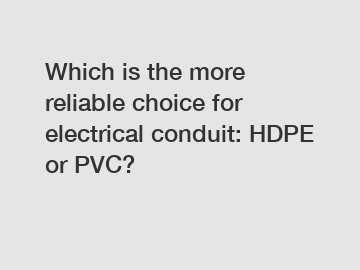Which is the more reliable choice for electrical conduit: HDPE or PVC?
When it comes to choosing the right electrical conduit for your projects, there are several options available in the market. Two of the most popular choices are High-Density Polyethylene (HDPE) and Polyvinyl Chloride (PVC). These materials have their own unique attributes and benefits which make them suitable for different applications. In this blog, we will delve into the pros and cons of HDPE and PVC conduits to help you make a reliable decision for your electrical installations.
HDPE conduits, made from a dense polymer, have gained significant popularity in recent years. One of the major advantages of HDPE is its exceptional durability. HDPE conduits are known for their resistance to impact, cracking, and corrosion, making them an excellent choice for installations in areas prone to harsh weather conditions or high traffic. Additionally, HDPE conduits have a longer lifespan compared to PVC, ensuring that your electrical system remains protected for years to come.
Furthermore, HDPE conduits offer superior flexibility. Their ability to bend without the need for additional fittings makes them ideal for installations requiring complex and curved pathways. This flexibility not only cuts down on labor costs but also allows for easier and more efficient installation, especially in confined spaces. HDPE conduits are also lightweight, which further adds to their ease of installation.

Another advantage of HDPE conduits is their resistance to chemicals and UV radiation. This makes them highly suitable for outdoor installations or areas where exposure to chemicals is common, such as industrial or agricultural settings. HDPE conduits do not degrade or lose their structural integrity when exposed to sunlight, chemicals, or organic solvents, ensuring reliability and safety for your electrical system.
On the other hand, PVC conduits have their own strengths and applications. PVC is a widely used material due to its affordability, making it a popular choice for residential and small-scale projects. PVC conduits are easy to work with, as they can be quickly cut and joined using solvent cement. This ease of installation can save time and money for those with limited budgets or tight project deadlines.
In terms of fire safety, PVC conduits have a higher fire resistance rating compared to HDPE conduits. They tend to self-extinguish when exposed to flames, reducing the risk of fire spreading through electrical conduits. This is an important factor to consider, especially in commercial or industrial applications where fire safety regulations are stricter.
One potential drawback of PVC conduits is their limited flexibility. PVC pipes are relatively rigid, making it challenging to install them in tight spaces or areas requiring multiple bends. This can increase labor costs and installation time, especially when compared to the flexibility of HDPE conduits.
It is also important to note that PVC conduits may be susceptible to degradation over time due to exposure to sunlight and certain chemicals. While this may not be a concern in all installations, it is essential to assess the environmental conditions of your specific project to determine the suitability of PVC conduits.
In conclusion, both HDPE and PVC conduits have their own unique set of attributes and benefits. HDPE conduits offer exceptional durability, flexibility, and resistance to harsh weather conditions, making them highly reliable for long-term electrical installations. On the other hand, PVC conduits are more affordable and have higher fire resistance ratings, making them suitable for residential and small-scale projects.
To choose the more reliable choice between HDPE and PVC conduits, consider the specific requirements of your project. Assess factors such as environmental conditions, budget constraints, installation complexity, and fire safety regulations. Consulting with experienced electrical professionals can further assist you in making an informed decision based on your specific needs.
Ultimately, reliability in electrical conduits depends on selecting the right material for the job. Whether you choose HDPE or PVC, it is crucial to prioritize safety, durability, and compatibility with your project requirements to ensure a successful electrical installation.
If you want to learn more, please visit our website hdpe dredge pipe, difference between mdpe and hdpe, hdpe gas pipe pressure rating.
41
0
0

Comments
All Comments (0)